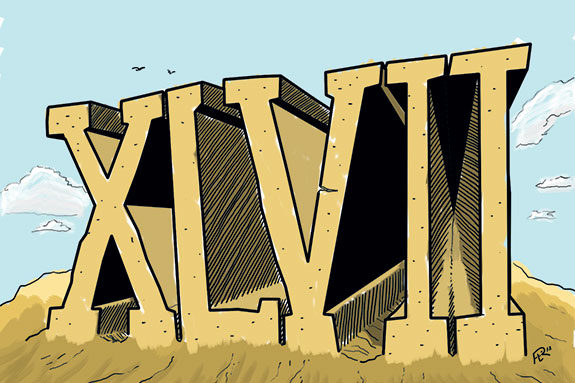“When you are at Rome, live in Roman style; when you are elsewhere, live as they live elsewhere.” —St. Ambrose
Why is each year’s Super Bowl labeled with majestic, 3-D Roman numerals instead of numbers we can really comprehend?
Fathoming a 2,000-year-old Latin-based numerical system wasn’t too tedious when it was Super Bowl V or X – even when it got to XXV. But, because Nero threw in some I’s and an L or two, it got to be pretty hard for dopes like myself to keep it all straight as the seasons progressed.
Nonetheless, these visions of V’s and X’s and M’s catapult our modern mentality – for a Sunday in February, anyway – back to elements of that Age of Classical Antiquity. You know – Caesars, gladiators, aqueducts, complete and utter annihilation, etc. from a long time ago.
Of course, we’re much more “civilized” now – just take a long look around and you’ll see what I really mean. But after, when ya got nothin’ better to think about, ask yourself the question as to why oh why does such a gaudy, modern, Americanized game as the Super Bowl spike itself onto this ancient element of this Germanically ravaged empire? What’s the attraction? What’s the advantage? There’s gotta be an answer.
Looking back, weren’t we all first acquainted with Roman numerals in our elementary years? I remember when my sixth-grade teacher, Mr. Lunenschloss – hardly a Roman descendant – culminated our unit on the Romans by throwing a first-century-like shindig in our small gymnasium in Bangor, Wisconsin.
We wore our beds’ sheets and our dads’ sandals. We donned imitation wreaths on our heads and colored sashes across our shoulders. We ate roasted pigs and buttered figs – and swilled big ol’ swigs of imitation grape juice. Chuck Klos and I Greco-wrestled on an unfolded tumbling mat right before the feast to the piercingly pitched pipes of sixth-grade classmates.
I’ll never forget that day. I still picture myself as an unarmed, less-violent version of “Gladiator’s” weapon-wielding hero, “Maximus” – except without the girl.
Neither will I forget what we learned about the civilization that obliterated just about all that was Greece. Roman civilization, like ours, eventually celebrated Christmas. Its rich lived in really nice places and its poor in shabbiness just like we do now.
They had sewers just like we possess – both then and now, we love the household canine – and, though maybe not as well designed, they wore underwear like we do today. And no doubt that yesteryear’s laurelled gladiators are today’s Super Bowl opponents, don’t ya think? Of course you do. Today’s savagery excludes the sharp, malevolent cutlery, but that’s about it.
Rome also had holidays – lots of ’em. The most noteworthy for this issue was the celebration in honor of “Caristia” – the Goddess of Harmony – held each February 22. Everyday Romans would gather in their home, feast on delicacies, offer to their gods and settle on their disputes – sounds a lot like a Super Bowl Sunday to me, minus the high-definition big screen.
But for now, let’s go back to the history of Super Bowl Roman numerology. I don’t know if many of you remember, but there really wasn’t any “Super Bowl I” or “II” or “III” at the time – nobody had thought it up yet.
It wasn’t until after Joe Willy Namath’s surprising, upset victory against another ancient – the Colts’ Johnny Unitas – that NFL Commissioner Pete Rozelle and AFL counterpart Lamar Hunt forecasted the allure and greatness of this game and decided to add a quasi-historic touch of antiquity by both renaming the first three NFL/AFL Championship Games as Super Bowl I, II and III and also permanently attaching the Roman numeral moniker to each ensuing contest.
Little did they know the level of confusion it would cause.
One other lesson that Mr. Lunenschloss taught me that we all should realize is that the mighty, powerful Roman Empire fell – and fell hard. And it was my teacher’s descendants, the Germanic invaders, who were a part of it, but just a part.
Cruel slavery, political greed, underfunded military, sexual perversion, poor self-discipline, slothful laziness – all contributed to the slow, methodical breakdown of the whole institution known as Rome. Slowly but surely and bit by bit, one territory after another fell. Though it took a couple of centuries to do so, ancient Rome ironically went the way of those it destroyed – to dust.
Correct or not, America prides itself on its so-called intellectual ability. And history provides an easy lesson to learn with the rise and fall of the Roman Empire. Will America learn the lesson and implement the strategies needed to prevent history from repeating itself? Only time will tell – but both action and prayer would no doubt help the cause.
So, for this February 3, here are some ideas. Invite family and friends over to your home but make it toga-required. In lieu of jerseys, have fans wear laurel. Also, instead of serving guacamole dip, shrimp and chili, consider figs, dates, turnips, fish and wine.
Instead of watching Beyonce at halftime, have ready a DVD of “Spartacus” or “Cleopatra” to keep the Roman flavor going. Feel free to use the facilities during commercials. But, please, no visits to the vomitorium!
It’s perfectly normal and healthy to recreate history. But to repeat it – especially the mistakes – isn’t. Let’s hope and pray it doesn’t.
Finally, the $64,000 question to those of us who think that we’re smarter than a fifth grader is as follows: What is the Roman numeral equivalent to the Super Bowl which will be held in 2053?
It hurts to think about, doesn’t it?
God-speed to the change this nation and this world needs. PD
Jeff Churchwell is a Wisconsin-based freelance writer and a perpetual milk-drinker who thrives on 1 percent to this day.





